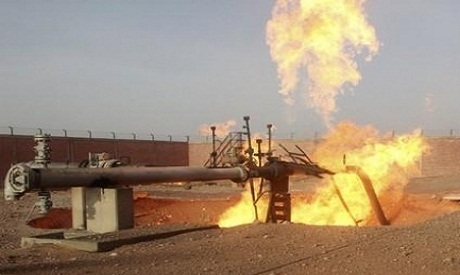 Egypt has unilaterally terminated its natural gas export contract with Israel, a shareholder in the export operating company, East Mediterranean Gas Company (EMG), said Sunday night.
Egypt has unilaterally terminated its natural gas export contract with Israel, a shareholder in the export operating company, East Mediterranean Gas Company (EMG), said Sunday night.
Ampal-American Israel Corporation, which owns a 12.5 per cent stake in EMG, announced in a statement that it had been notified by EMG that Egypt was ending the Gas Supply and Purchase Agreement between the two parties.
“Egyptian General Petroleum Corporation [EGPC] and the [state-run] Egyptian Natural Gas Holding Company [EGAS] notified EMG that they were terminating the Gas Supply and Purchase Agreement between the parties,” the Ampal statement read.
The company added that "EMG considers the termination attempt unlawful and in bad faith, and consequently demanded its withdrawal," noting that EMG, Ampal and EMG's other shareholders were "considering their options and legal remedies as well as approaching the various governments."
In initial reactions by Israeli government officials to Egypt's decision,Yoval Steinietz, the Israeli minister of finance, expressed deep concern towards Cairo's unilateral decision.
Steinietz told Radio Israel that the decision carries serious political and economic implications for the Camp David peace accords.
Meanwhile, Shaul Mofaz, the Knesset opposition leader, described Egypt's decision as a possible breach of the Camp David accords, and called on the United States, as a broker of the peace treaty between the two countries, to immediately take a clear stand.
However, Mohamed Shoeib, the CEO of EGAS, told Egyptian satellite CBC news on Sunday evening: ""The decision we took was economic and not politically motivated. We cancelled the gas agreement with Israel because they have failed to meet payment deadlines in recent months."
Egypt's Mubarak-era gas deal with Israel has been fenced with controversy since its inception.
Some critics accused the ousted Egyptian strongman of selling the gas to Israel at below international prices, thus depriving the Egyptian economy of badly needed funds.
Mubarak is currently on trial, facing charges of conspiring with fugitive businessman Hussein Salem to export gas to Israel at below market prices.
Former minister of petroleum, Sameh Fahmy, as well as other former Egyptian officials are also on trial because of the prices stipulated in the gas deal with Israel.
Egyptian courts are yet to rule in the two cases.
For their part, however, Israeli officials repeated at several occasions that the price they pay for natural gas is better than other regional exporters receive and is in line with international prices.
Other critics have decried what they describe as government complicity in financially supporting Israel's war on the Palestinians.
Egyptian authorities announced plans in November 2011 to step up pipeline security with the installation of alarm systems and security patrols carried out by local Bedouin tribesmen.
Israel, which depends on Egyptian natural gas for 40 per cent of its energy needs, has been adversely impacted by the repeated interruption of gas supplies resulting from frequent attacks on the north Sinai pipeline since last year's revolution.
The pipeline transporting Egyptian gas to Israel and Jordan has been rocked by 14 explosions – by unknown assailants – since the January 25 2011 uprising that led to the ouster of longstanding president Hosni Mubarak.
Previous explosions have resulted in weeks-long supply stoppages of the pipeline run by Gasco, an EGAS subsidiary.
Supply has been halted since a previous attack on 5 February 2012. The last attack took place on 9 April.
No group has claimed responsibility for the attacks on the pipeline, which transverses an increasingly restive Sinai Peninsula.
The 20-year natural gas deal signed between Israel and Egypt in 2005 has been a pillar of Egyptian-Israeli economic cooperation following the historic 1979 peace treaty between the two countries.
Over the course of the last decade, Egypt has become a key natural gas producer, developing gas fields in the Mediterranean Sea. It began exporting liquid natural gas (LNG) in early 2005 to Israel as well as Jordan and Spain.



